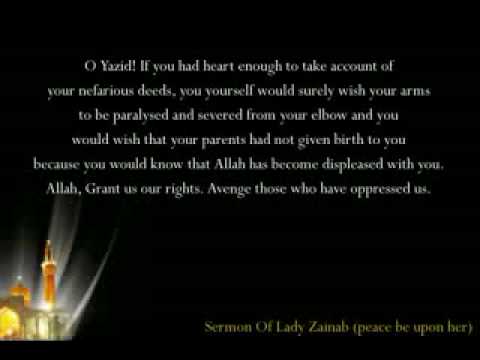I remember when I first came across the poetry of Yazeed. He was touted as a master of description. Naturally, he is drawn to the opposite sex in his work. So many of the classic Arab poets have taken up that subject matter. Their physical appearance; the description of white flesh, red lips, and the curves of their figure. Their power was always related to their seductive wiles. Their ability to use their physical attributes to reel in the opposite gender and render them powerless.
Yes. Powerless. Figuratively and literally (often supplied wine by ruby cheeked vixens) intoxicated by their prowess, or -alternatively- their portrayal of sexual naiveté.
Women were never much more to him than a game. A challenge. An outlet for creative frustration.
I guess that is part of why the image of Zainab (as) strikes me as it often does. I will always remember the first visual I had of her. The first time I ever really paid attention to her name. She mesmerized me. She walked along the marble floors of a palace seeped in vitriolic aggression against everything she held dear. Everything she believed. In many ways I still struggle to visualize her grace. I often image she was strengthened by a God consciousness that would overwhelm those who hadn’t experienced loss and love in a similar fashion. There she stood. Her voice firm. Her dignity intact despite power, propaganda, and loss all conspiring against her in glorious ways.
My first real glimpse of Zainab.
The story of how she confronted a tyrant is how she was introduced to me. I suppose then that it makes sense for me to love her as I do. I am a woman. I am a Muslim-American. These roles are often accompanied by blessing and strife, and through the prism of my experiences I have cultivated an abiding admiration for strong women. Women who refused merely satisfy the role that society demanded of them. I have always admired Queens who ruled without consorts. Women who influenced change on a grassroots level. Female friends who strived for advanced degrees, who teach their sons to marry women who actually intimidate them. They all have woven their stories into my life. Into my understanding of what it means to be a woman.
But I only admire them because of Zainab.
I loved her first because she was never far removed. Oppressed humanized her. She was like a friend to me. She taught me about love and selflessness. She also taught me that people are often mean, vengeful, and wrong. That I may often exhibit those same qualities in moments of weakness. That there is good in the world, but also misunderstanding and oppression. That I should come to God for love before I seek approval in others. To walk like Zainab, I knew I could never accept many of the labels bestowed upon women as the gentler sex.
In so many ways, Zainab has challenged so much of what I know about my own womanhood, the narrative at Yazeed’s court, and the modern day perception of Middle Eastern women in the courts of Caliphates. She is never outwardly scared. She never falters. Why should she? All she sees is God. Justice. Sacrifice.
Hussain.
Descriptions of God, his mercy and his benevolence, are scattered throughout her eloquent address despite the trauma of what she has experienced. She shifted hearts and minds with her words. Shaped history. Challenged perceptions of victimhood. Of suffering.
I imagine that someday, if it is maktoob, I will have a daughter of my own. I will do my best to give her the best in spiritual and material wealth. I will teach her to be strong and live life with conviction. I will teach her to always have room in her heart for God when it feels like people have let her down. To accept that humans are often mean, vengeful, and wrong. That she may at times exhibit those qualities in moments of weakness. That there is good in the world, but also misunderstanding and oppression.
If she asks me, in moments of thoughtful pause, how she is to deal with all the injustice of the world? I will tell her to do so with dignity and strength.
I will tell her to walk like Zainab.
Listen to the speech of Syeda Zainab (as) here.
The author is Iraqi American and has a MA & BS in Political Science. She regularly writes about gender, politics, and spirituality. Read more at Saja’s blog: vivalakhabatha.wordpress.com.
This piece was originally published on Muharram in Manhattan. For additional information, please visit MuharramInManhattan.com.





